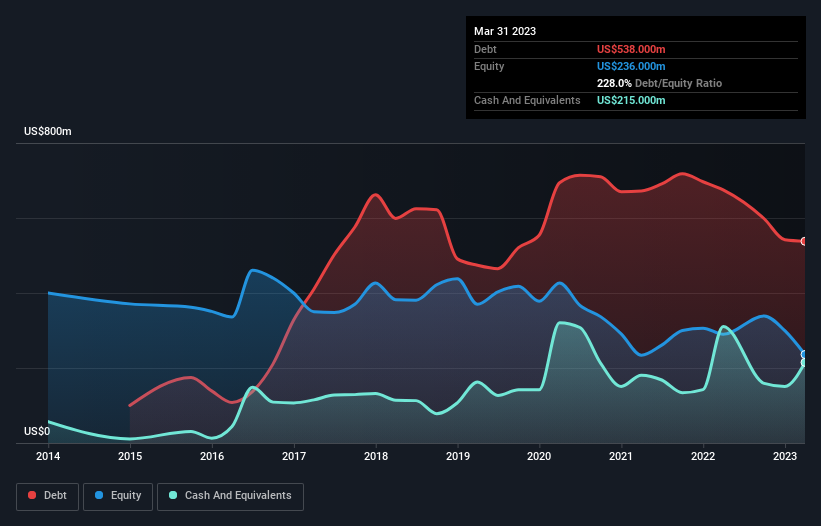- United States
- /
- Entertainment
- /
- NasdaqGS:BATR.K
Here's Why Atlanta Braves Holdings (NASDAQ:BATR.K) Can Afford Some Debt
Warren Buffett famously said, 'Volatility is far from synonymous with risk.' So it might be obvious that you need to consider debt, when you think about how risky any given stock is, because too much debt can sink a company. We can see that Atlanta Braves Holdings, Inc. (NASDAQ:BATR.K) does use debt in its business. But the real question is whether this debt is making the company risky.
When Is Debt Dangerous?
Debt assists a business until the business has trouble paying it off, either with new capital or with free cash flow. If things get really bad, the lenders can take control of the business. However, a more frequent (but still costly) occurrence is where a company must issue shares at bargain-basement prices, permanently diluting shareholders, just to shore up its balance sheet. Of course, plenty of companies use debt to fund growth, without any negative consequences. When we think about a company's use of debt, we first look at cash and debt together.
View our latest analysis for Atlanta Braves Holdings
What Is Atlanta Braves Holdings's Net Debt?
As you can see below, Atlanta Braves Holdings had US$538.0m of debt at March 2023, down from US$675.0m a year prior. However, it does have US$215.0m in cash offsetting this, leading to net debt of about US$323.0m.

How Strong Is Atlanta Braves Holdings' Balance Sheet?
Zooming in on the latest balance sheet data, we can see that Atlanta Braves Holdings had liabilities of US$335.0m due within 12 months and liabilities of US$947.0m due beyond that. Offsetting these obligations, it had cash of US$215.0m as well as receivables valued at US$23.0m due within 12 months. So its liabilities total US$1.04b more than the combination of its cash and short-term receivables.
This deficit isn't so bad because Atlanta Braves Holdings is worth US$2.18b, and thus could probably raise enough capital to shore up its balance sheet, if the need arose. But it's clear that we should definitely closely examine whether it can manage its debt without dilution. When analysing debt levels, the balance sheet is the obvious place to start. But it is Atlanta Braves Holdings's earnings that will influence how the balance sheet holds up in the future. So when considering debt, it's definitely worth looking at the earnings trend. Click here for an interactive snapshot.
In the last year Atlanta Braves Holdings wasn't profitable at an EBIT level, but managed to grow its revenue by 4.5%, to US$597m. We usually like to see faster growth from unprofitable companies, but each to their own.
Caveat Emptor
Over the last twelve months Atlanta Braves Holdings produced an earnings before interest and tax (EBIT) loss. Indeed, it lost US$34m at the EBIT level. Considering that alongside the liabilities mentioned above does not give us much confidence that company should be using so much debt. So we think its balance sheet is a little strained, though not beyond repair. We would feel better if it turned its trailing twelve month loss of US$80m into a profit. So we do think this stock is quite risky. When analysing debt levels, the balance sheet is the obvious place to start. But ultimately, every company can contain risks that exist outside of the balance sheet. For instance, we've identified 1 warning sign for Atlanta Braves Holdings that you should be aware of.
If, after all that, you're more interested in a fast growing company with a rock-solid balance sheet, then check out our list of net cash growth stocks without delay.
New: Manage All Your Stock Portfolios in One Place
We've created the ultimate portfolio companion for stock investors, and it's free.
• Connect an unlimited number of Portfolios and see your total in one currency
• Be alerted to new Warning Signs or Risks via email or mobile
• Track the Fair Value of your stocks
Have feedback on this article? Concerned about the content? Get in touch with us directly. Alternatively, email editorial-team (at) simplywallst.com.
This article by Simply Wall St is general in nature. We provide commentary based on historical data and analyst forecasts only using an unbiased methodology and our articles are not intended to be financial advice. It does not constitute a recommendation to buy or sell any stock, and does not take account of your objectives, or your financial situation. We aim to bring you long-term focused analysis driven by fundamental data. Note that our analysis may not factor in the latest price-sensitive company announcements or qualitative material. Simply Wall St has no position in any stocks mentioned.
About NasdaqGS:BATR.K
Atlanta Braves Holdings
Through its subsidiary, Braves Holdings, LLC, owns and operates the Atlanta Braves Major League Baseball Club in the United States.
Imperfect balance sheet with minimal risk.
Market Insights
Community Narratives




